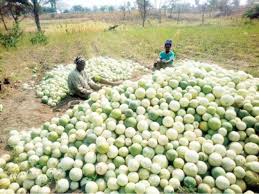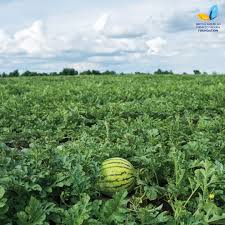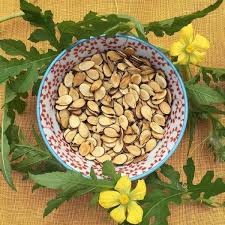![]()
If you’ve landed on this article page, you’re probably searching for a
good business idea—an idea that’s light on the pocket but heavy on
returns, promising both a fulfilling journey and potential profit.
|
How to start Melon (Egusi) Farming in Nigeria
Melon farming, particularly the cultivation of Egusi (Citrullus
lanatus var. colocynthis), is a lucrative agricultural venture
in Nigeria. Known for its versatility in Nigerian cuisine, Egusi
is a sought-after ingredient in soups and stews, making it a
valuable crop for both domestic and international markets.
The profitability of melon farming in Nigeria depends on various
factors, including market prices, the scale of production, and
effective farm management. On average, a well-managed melon farm
can yield substantial profits. However, it’s essential to note
that market prices can fluctuate, so conducting market research
and finding reliable buyers or markets is crucial.
Starting a profitable melon farming (Egusi) business in Nigeria
is a viable venture with the potential for significant returns
on investment. By carefully planning your budget, investing in
quality inputs, and practicing effective farm management, you
can increase your chances of success in this thriving
agricultural sector.
Land: Secure a suitable plot of land for your melon farm. The
size of the land will depend on your scale of operation, but you
can start on a small scale with as little as half an acre. Land
preparation and leasing costs may vary by location.
Seeds: Purchase high-quality melon seeds. It’s advisable to
choose improved varieties that are disease-resistant and have a
higher yield potential. The cost of seeds will depend on the
quantity needed for your farm size.
Fertilizers and Soil Amendments: Invest in organic and inorganic
fertilizers to improve soil fertility. The type and quantity of
fertilizers required will depend on soil test results.
Irrigation System: In areas with irregular rainfall patterns,
consider installing an irrigation system to ensure consistent
water supply for your melon plants.
Pest and Disease Control: Budget for pesticides and herbicides
to protect your melon crop from pests and diseases.
Melon is planted the same way other crops like maize, okra and
watermelon are planted in Nigeria.
Egusi can be planted in nursery but is more preferable to plant
them directly to the field because of their fragile nature.
Land Preparation : Chose a suitable site, get the land ready by
clearing and tilling the soil. Make ridges and beds especially
if the land is hard. If possible, do land conditioning for
maximum output.
The best soil to use is sandy-loam or slightly clayey soil rich
in organic matters. You can dress the land with manure 2 weeks
before planting if there is need for it.Do not plant them on
waterlog area because they won’t survive.
How To Plant Melon : Egusi seed is planted with the shell, drop
2-3 seeds into a hole of 2cm deep and cover lightly with soil.
Space them 2m by 2m. Melon can be inter-planted with cassava or
any other crops but for business purpose plant only melon.
Pest/Diseases : Common pests that affect melon plants are
whiteflies, mites, fruit flies. The common diseases are mosaic –
a virus disease that affects melon plants by causing stunted
growth. Others are aphids, fusarium etc. Uproot affected plants.
Apply insecticides and pesticides. You can use neem oil or
water.
In all melon plants are very resilient and cares suppress
diseases and pest manifestations. If a good land conditioner is
used it will an added advantage to the plant in diseases
resistance.
Application Of Manure : You should apply fertiliser in every
stage of their development, ie; germination, sprouting,
flowering and fruiting.
It is preferable you go for the organic manure like
animal dung, but when using inorganic, go for NPK 15 15 15 and
urea.
Weeding : The ground cover by the egusi crops suppresses the
weeds, so you won’t have to weed after four weeks of planting.
Planting Time : Recommended planting time is in the month of May
to june in Nigeria.
Emergence occurs in 4-7 days. Four weeks after planting,
flowering occurs and vines form a nearly complete ground cover,
suppressing weed growth.
Effective ground cover using Egusi Melon for crop interplanting
may be achieved with 20,000 Egusi Melon plants per hectare.
Weedings in primary crops like maize have been reduced from 2-3
weedings, to one, when interplanted with Egusi Melon. Yields are
best on fertile humus rich loose soil.
Egusi Melon tolerates dry to wet growing conditions but fruits
mature only in dry conditions 4 months after sowing.
Harvesting And Seed Production: Harvest fruits after they stop
enlarging; they will keep well for several months in storage.
Seed removal from the solid pulp requires breaking the fruit
with a hard stick (not a machete which will slice some of the
seeds) and lying the pieces pulp side down on the soil for
several days. During this time the pulp decays.
Wash the seeds from the remaining pulp; allow the seeds to dry
before storage.
The seeds need to be dehulled before use as food. About half the
weight of the seed is in the hull.
Storage Facilities: If you plan to store your harvested melons,
invest in proper storage facilities like a well-ventilated barn
or warehouse.
Transportation: Consider transportation costs for taking your
produce to the market or distribution points.
At the moment, only sesame can compete with the product in the
market. Ten 170kg bags of egusi will give a farmer between N1.2M
and N2 million under the current market price depending
on the market location.
Do you know that EGUSI that is sold expensive in cities like
Lagos,P.H,Onitsha,etc. are very cheap in the North?... Peeled
Melon in the North are sold in a container known as mudu. In
cities Melon are retailed mostly in Milk Cup.
A mudu in the North is between #1500
to #2,000 depending on the time of the year.
Melon is sold in Milk Cup in Lagos, PH, Onitsha, even Ibadan
@ #500 per Milk Cup.
A Mudu has nothing less than 9 Milk Cups inside.
That means 9x500= N4500. That means if you buy from the North
you can sell and make over 100% profit on your investment
Melon is one of the most expensive products yet the cheapest
crop to grow. If a farmer wants to become a millionaire in a few
years, he should go into melon production. The only challenge of
melon is that it is not a water-loving crop. The reason is that
when there is high moisture in the soil, it builds up pest
infestation. The challenge of melon is insects that attack it.
Some people believe that melon is not for every year; meaning
that, if you planted in 2018, then, 2019 would not be the year
for melon until 2020. It also means that in 2018 when melon was
planted, a provision for food for its insects had been made so
they will multiply such that the following year, the number of
insects in that field will not allow the farmer to gain anything
if he plants it. So farmers allow one year to fallow so that
those insects would be suppressed and die before they go back
into the field again,
Remember to continuously educate yourself about melon farming
techniques, market trends, and pest control methods to stay
competitive and ensure long-term profitability in the industry.
Get our Practical Guide on Egusi Farming in Nigeria. . We will
cover the capital required, profitability, and essential steps
to ensure your success. This guide covers all aspects of
establishing Melon
farms, from suitable varieties and site selection to soil
management, pest control, harvesting best practices,
|







